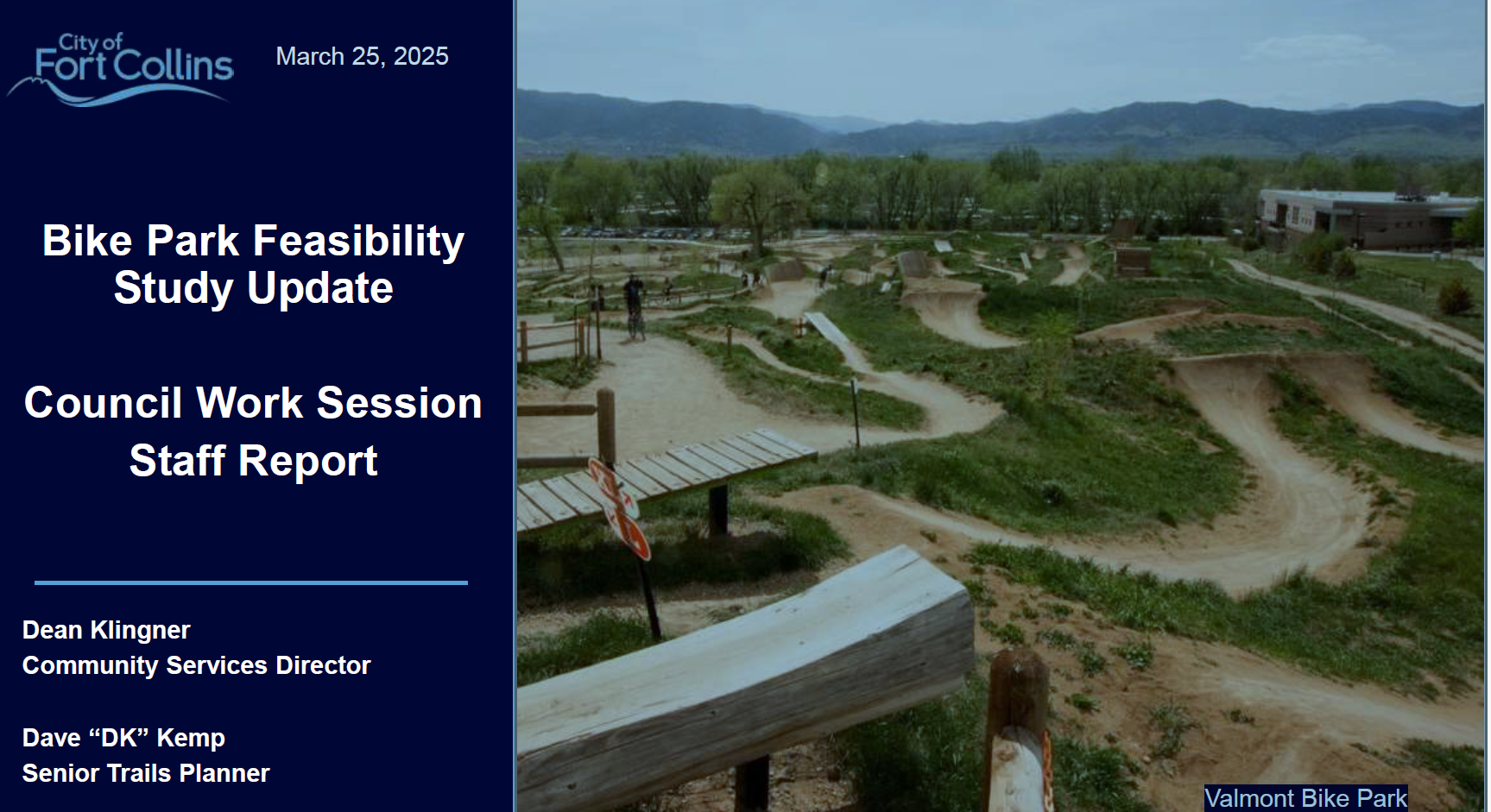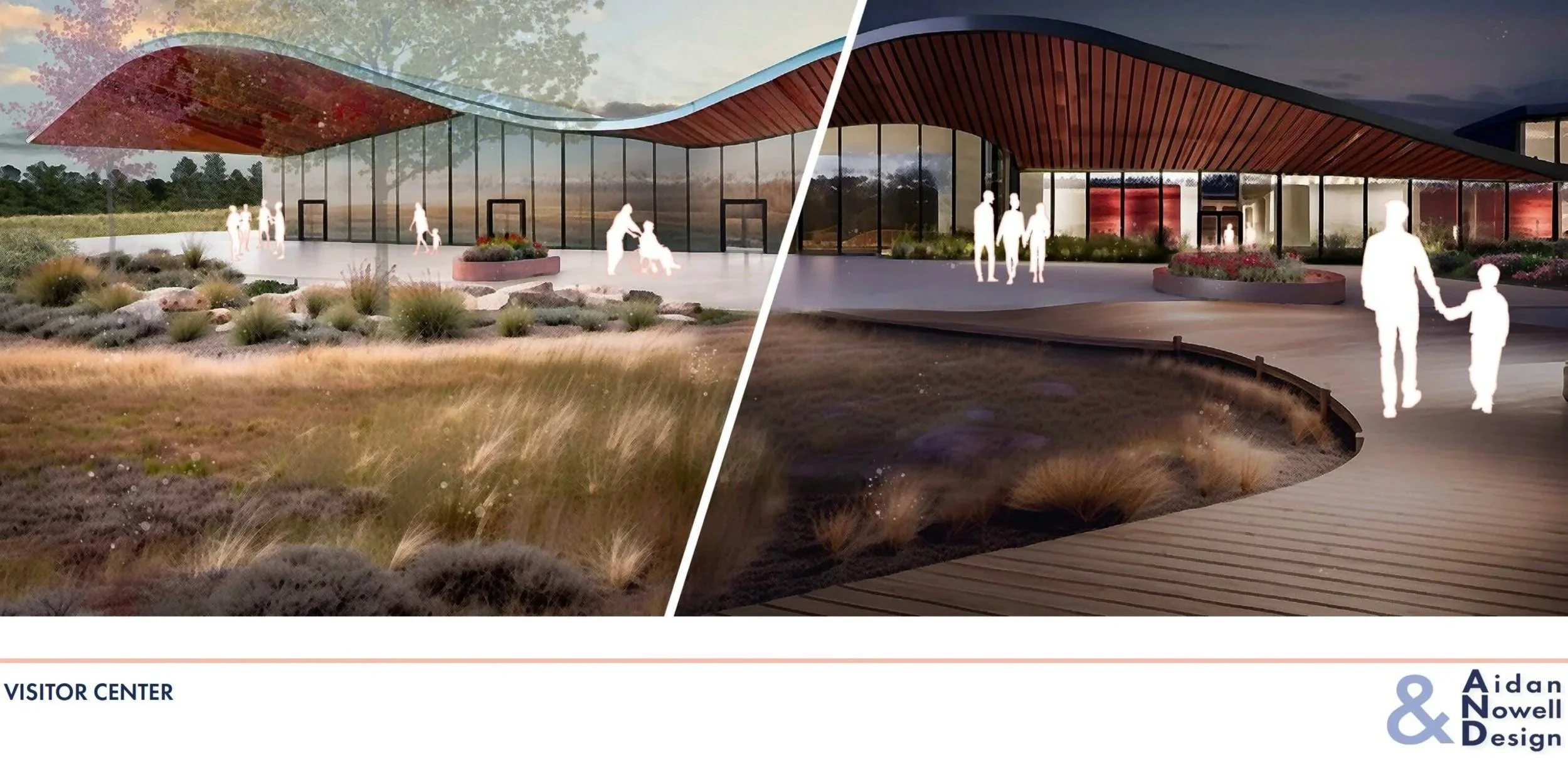CON 2H - Statement Against Measure 2H, Fort Collins City Council Ballot Measure to Develop Hughes for a Large Mountain Bike Park and Multiple Buildings/Facilities for Private Interests
Screenshot from Bike Park Feasibility Update Presentation to Council by Staff. The results of the $70,000 study still have not been released to the public.
There are several key issues of concern with this ballot measure, centered on the risk of high-impact development on one of the last large, city- owned open spaces along the foothills. The proposal also contradicts the intent of a 2021 voter-approved measure which called for the land to be preserved for natural areas, open space, and low-impact recreation.
Conflicting Goals: The measure allows for a bike park, wildlife rehabilitation facility, and other developments that would occupy more than 75% of the 165-acre site. There are no guarantees on minimum acreage for any use, meaning as little as one acre could be dedicated to natural areas while the rest remains open for unrestricted development. There are at least 40 acres unaccounted for in this measure, leaving voters questioning how unaccounted acreage will be developed. The City has not disclosed details of potential private partnerships or whether public land could shift into private hands, which has been proposed by the private wildlife groups. A large bike park is not a use that serves all ages, incomes, or abilities, leaving out older adults, people with mobility challenges, and those unable to afford participation. This directly contradicts the original voter mandate for low-impact, publicly accessible recreation.
Environmental Impact: The Hughes site lies in a critical ecological corridor that supports deer, elk, moose, coyotes, other mammals, amphibians and reptiles, and numerous bird species. Development would fragment habitat, reduce biodiversity, be destructive to the ecological integrity in the Foothills to Plains ecotone and disrupt wildlife migration. Adding roads, parking lots, and buildings would also increase the urban heat island effect and the City’s overall carbon footprint.
Traffic and Accessibility: The site is poorly located for regional users. It is not easily accessed from I-25 or nearby communities such as Loveland, Windsor, and Wellington. A more central, accessible location would better serve regional users while supporting local businesses.
Lack of Transparency and Planning: There are concerns over the transparency of the selection process for the development's "Private Opportunity" component. The Civic Assembly process used to shape this plan did not reflect the Assembly’s highest-ranked options, raising further concerns about transparency. The City has not released the feasibility study for the bike park, leaving voters in the dark on costs, alternatives, and impacts.
Unclear Future Ownership and Control: The wildlife nonprofit enterprises for whom 2H has been placed on the ballot have indicated they will only invest their own funds in restoration or permanent building construction at Hughes if they can own their carved out section of the Hughes land. They have also indicated that talks about such a transfer of Hughes from the public interest and public lands to private interest ownership and control has been discussed with the City’s real estate group. We are concerned that Hughes will be transferred to private organizations as a very lucrative land asset, which could then be sold to a private buyer in the future for any reason. The public that worked to save the land as a public interest asset would have no say in the matter or in the future of that substantial portion of the Hughes land.
Climate and Ecological Considerations: At a time when preserving open space and reducing emissions are essential to meeting the City’s climate goals, this measure moves in the opposite direction. Paving over open land would accelerate biodiversity loss, increase heat, add to the City’s carbon footprint and would conflict with the City’s climate action goals.
Potential for Incomplete Implementation: With no defined funding sources, timeline, or development plan—and in the context of the City’s current budget shortfalls—there is no assurance this project can be funded or maintained.
Summary: This proposal for the Hughes site development leaves the voters with many unresolved questions about land use, environmental impact, financial transparency, equity and alignment with voter intentions. The measure lacks sufficient clarity, raising concerns about its potential to undermine ecological preservation. With a lack of a specific site plan, the lack of specified funding sources and the fiscal impacts unknown, this measure threatens to impose serious financial burdens on taxpayers now and well into the future.
Screenshot from Raptor Center proposals
Screenshot from Raptor Center proposals





